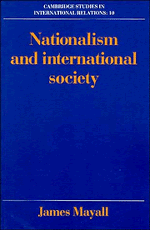Book contents
- Frontmatter
- Contents
- Acknowledgements
- Introduction
- 1 The search for the international system: the problem of theory
- 2 The society of states
- 3 Nationalism and the creation of states
- 4 Nationalism and the international order
- 5 Economic nationalism and the liberal world order
- 6 The new economic nationalism
- 7 Post-colonial nationalism
- 8 The third world and international society
- Conclusion
- Notes
- Index
1 - The search for the international system: the problem of theory
Published online by Cambridge University Press: 05 July 2011
- Frontmatter
- Contents
- Acknowledgements
- Introduction
- 1 The search for the international system: the problem of theory
- 2 The society of states
- 3 Nationalism and the creation of states
- 4 Nationalism and the international order
- 5 Economic nationalism and the liberal world order
- 6 The new economic nationalism
- 7 Post-colonial nationalism
- 8 The third world and international society
- Conclusion
- Notes
- Index
Summary
Everyone agrees that nationalism has had an enormous influence on international politics in the twentieth century. Whether this influence is to be regarded as benign or as a malignant growth, or whether it is merely a neutral fact, a datum which must be accepted before sensible political analysis can begin, is a more contentious question. All three positions have their adherents but they agree on little else than that national sentiment is pervasive and central to an understanding of the modern world.
For those who would like to construct a general theory of nationalism, the virtual absence of an authoritative account of its international impact is doubly regrettable. On the one hand, without such an account, nationalism itself will continue to resist ultimate explanation, since it will not be clear how far it springs from, or is constrained by, a particular kind of international environment. On the other hand, in the analysis of international politics, nationalism is likely to be regarded as a convenient black box into which whatever cannot be explained in any other way – and in the literature this has always been a great deal – can be filed away without further consideration. But, regrettable or not, the absence of an authoritative account will not be easily overcome. The reason for this can be illustrated by comparing the impact of nationalism on the politics of individual states, with its impact on the system of states in general.
- Type
- Chapter
- Information
- Nationalism and International Society , pp. 5 - 17Publisher: Cambridge University PressPrint publication year: 1990
- 1
- Cited by



